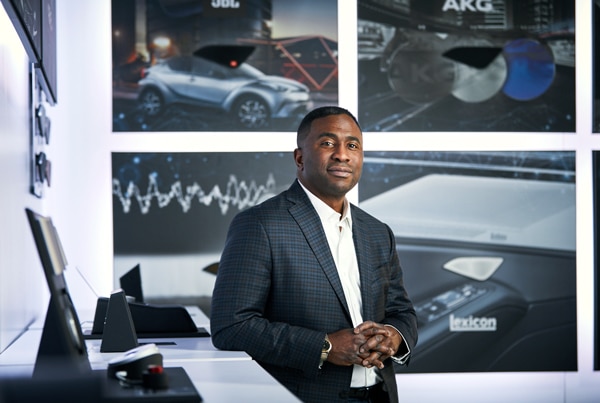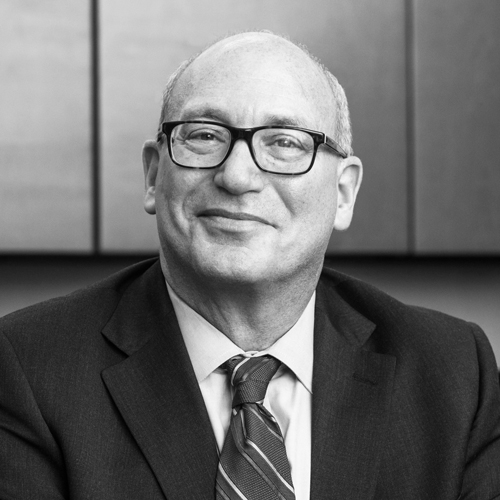
When you’re in charge of protecting more than 6,500 patent assets, you’re going to need some help. For Fred Owens, senior director of global intellectual property and patents for Harman, the Novi, Michigan-based subsidiary of Samsung Electronics that makes connected car systems, high-end audio and visual products, and enterprise automation solutions, much of that help comes in the form of outside counsel. Owens has made it a priority to foster greater collaboration between his in-house team and outside attorneys to protect the assets of such well-known brands as Mark Levinson, JBL, Harman Kardon, Revel, AKG, Infinity, Logic 7, and others.
Owens joined Harman about five years ago. Originally an engineer, he worked at Ford Motor Company for about ten years, and along the way he became a Six Sigma Black Belt and eventually earned a law degree from the University of Detroit (now known as the University of Detroit Mercy). He thought he would focus on environmental law for Ford. “I got into the emissions regulations side of the business,” he says. “But then I started investigating the IP aspects of it.”
His engineering background undoubtedly had something to do with that. “I really like the passion that inventors bring to the table when talking about their new ideas,” he says. “It’s their baby, and it’s nice to see that passion about what they are creating and its ability to improve society for the greater good.” He also was drawn to the science behind it. “I always liked science and math as a kid,” he says. “I played football and ran track at the University of Wisconsin, so part of me always tends toward teams. So, with that tinkerer’s knowledge of how things work, those two things are what you need for patent law.” It also helps to have a sense of discovery. “The exposure to new technology excites me,” he says. “In some areas of law, you work on the same thing every day. I like the constant variety of new technology.”
When he joined Harman, it was a much smaller company. It has since grown from about nine thousand employees to just under thirty thousand, he says, thanks to about a dozen new acquisitions his team has been a critical part of during his time there. That work helped lead to Samsung’s acquisition of Harman in 2017 for $8 billion.
Harman works in four distinct business areas. The first Owens calls the “connected car” space. “It’s about how people interface with their cars, with their phones and apps, navigation, driving-assistance technology, and music,” he says. Harman’s auto unit sells branded audio systems through several carmakers, including Toyota, Lexus, and BMW. About thirty million vehicles are equipped with Harman technology. “We are one of the largest suppliers of that technology in the world,” Owens says.
Its second area, high-end sound technology, is overseen by the lifestyle audio division, known best for its Harman Kardon brand. The division also focuses on car audio and peripherals such as headphones, portable speakers, and state-of-the-art surround-sound system technology. Its third area is overseen by the professional unit, which makes audio equipment such as monitors, amplifiers, microphones, and mixing consoles for recording studios, cinemas, touring performers, and others. “We provide the sound, lighting, and controls for big arenas like Madison Square Garden and the Boston Convention Center—and for smaller businesses,” Owens says. “One of our brands is JBL Pro, and if you are at Walt Disney World, you will see JBL speakers all over the place.” The fourth business area is engineering services, including cloud-based software as service, which Harman provides to companies such as Amazon, Jaguar, and Microsoft.
With such a diverse range of businesses within the company’s purview, Owens and his team have a large plate of IP assets to protect. “My task is to encourage innovation, so I want to support our businesses by capturing that innovation,” he says. To do that, upon his arrival at Harman, he helped implement a new global IP asset management system. “We needed to create relationships with outside counsel, to better interface with Harman and between themselves, all within our own system, which is pretty cool,” he says. “We wanted to create that community between ourselves, outside counsel, and our internal clients inside the business.”
In the typical model, he says, an internal client asks for something, then the legal department hires outside counsel, sends a file, and helps bring it home at a reasonable cost. “In today’s world, the speed of change is such that it introduces a lot of complexity, and one problem with the old model is that I would tell the outside attorney what to do and he would try to do it,” Owens says. “We tried to make outside counsel more like partners with us. We give them more access and the opportunity to work with our clients so that they are able, on their own, to understand and serve Harman best without having to be told what to do. They are empowered and understand our business enough to deliver quality patent applications and counseling without asking permission to do what’s best for Harman.”
Harman’s outside counsel, including Martin J. Sultana, shareholder and cochair of the autonomous vehicle practice group for Brooks Kushman, appreciate the company’s efforts to keep them more closely involved. “Fred is a true team player, and we thoroughly enjoy being part of his team,” Sultana says. “Fred’s collaborative approach with outside counsel allows us to provide work product that is aligned with Harman’s business initiatives.”
This new model helps keep Owens’s internal team of eleven lean. “With over 6,500 patents globally, eleven is too small a team to manage that many assets,” he says. He uses outside counsel mainly to file patent applications, and his internal team primarily focuses on understanding the business and leveraging Harman’s portfolio. “Maintaining a portfolio is very expensive,” Owens says. “Patents are not cheap; you can spend over $200,000 per patent family during its lifetime. So, you need to protect the assets that are most important to you and look for opportunities to trim less important ones away.” That may mean selling or licensing certain patents or dropping them to “save money and using those resources for new business models.”
In addition to implementing the asset-management system, Owens set up regular meetings with outside counsel. “Every two years or so, we bring all our outside counsel together, sit down with our key service providers, and share with them what is going on in the various businesses,” he says. “We believe that the more you know about our business, the better you are able to deliver quality and see new opportunities for Harman. Innovation doesn’t always originate on the inside. I want my outside counsel thinking outside the box as well.”
These changes helped Harman almost double its new invention disclosures between 2012 and 2017. “Our asset portfolio has grown as well, so we know it’s working,” Owens adds. “As our outside counsel have gained better understanding of what we do, our time to file has improved by 25 percent. We see the benefit of improved relationships with outside counsel in the speed we can take an invention disclosure and get it filed.”
Harman’s Key Numbers
30,000 professionals worldwide
15,000 engineers
6,529 patents and patents pending
16+ luxury brands
80 percentage of luxury cars with Harman systems
Expertise Spotlight
Brooks Kushman P.C. is a leading intellectual property (IP) and technology law firm with offices across the nation, and it represents clients such as Harman nationally and internationally with respect to protection, enforcement, and monetization of IP, including patents, trademarks, copyrights, and trade secrets. The firm has more than ninety intellectual property professionals specializing in various technical disciplines, and it has a reputation for providing leading IP counseling with a focus on the business objectives of its clients.
Brooks Kushman counts a number of Fortune 100 companies across a variety of industries among its clients. The firm is also recognized by leading legal publications and ranking organizations, including Corporate Counsel, U.S. News & World Report, Law360, Chambers and Partners, Intellectual Asset Management, Managing Intellectual Property, and World Trademark Review. For more information, please visit www.BrooksKushman.com


